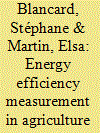| Srl | Item |
| 1 |
ID:
127899


|
|
|
|
|
| Publication |
2014.
|
| Summary/Abstract |
Measuring energy efficiency is crucial when planning energy reduction policies. However, decision makers are understandably reluctant to act in the absence of solid data and results supporting a policy position. This paper proposes a methodology to measure the energy efficiency of farms based on the Data Envelopment Analysis (DEA) approach. In a manner similar to the cost framework, we decompose energy efficiency measurements into technical and allocative efficiencies in energy contents of inputs. In this study, we replace input prices used in traditional economic efficiency measurements by their energy content. We use the energy efficiency model to explore the optimal input-mix that produces the current outputs at minimum energy-consumption. We demonstrate that this decomposition can help policy makers design accurate energy policies. However, the uncertainty of the data and, more particularly, the energy content of the inputs leads us to recommend using the methodologies to calculate the bounds of efficiency to obtain more plausible and robust results. Based on our analysis, energy efficiency is not a fixed value, and policy-makers should consider it with caution. We use a 2007 database of French farms specialised in field crops for empirical illustration.
|
|
|
|
|
|
|
|
|
|
|
|
|
|
|
|
| 2 |
ID:
127882


|
|
|
|
|
| Publication |
2014.
|
| Summary/Abstract |
Several projects in the European Union (EU) are currently under development to implement the carbon capture, transport and storage (CCS) technology on a large scale and may be subject to public funding under EU support initiatives. These CCS projects may develop any combination of three types of operating levels: pilot, demonstration and full-scale, representing progressing levels of electric power generation capability. Several projects have commenced at the demonstration level, with full-scale commercial levels planned for approximately 2020. Taking the perspective of a funding agency, we employ a real options framework for determining an optimal project selection and funding strategy for the development of full-scale CCS plants. Specifically, we formulate and solve a stochastic dynamic program (SDP) for obtaining optimal funding solutions in order to achieve at least one successfully operating full-scale CCS plant by a target year. The model demonstrates the improved risk reduction by employing such a multi-stage competition. We then extend the model to consider two sensitivities: (1) the flexibility to spend that budget among the time periods and (2) optimizing the budget, but specifying each time period's allocation a priori. State size and runtimes of the SDP model are provided
|
|
|
|
|
|
|
|
|
|
|
|
|
|
|
|